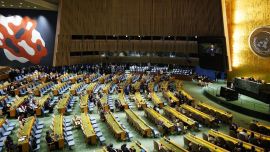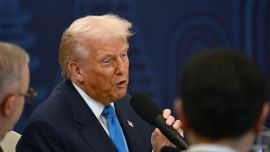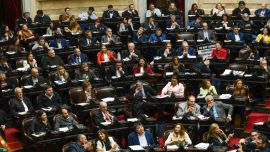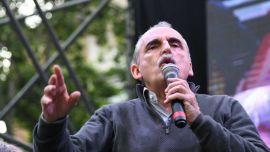The administration led by self-proclaimed “anarcho-capitalist” economist Javier Milei is anything but normal. This was clearly intentional given their status as outsiders throughout the political campaign, their central message being that someone has to do something about the “caste.”
Weirdly enough, Milei, sister Karina, the five cloned English mastiffs he calls his “four-legged sons,” and the Cabinet were initially characterised as pragmatic, given a certain plasticity which felt different from the ideologised rhetoric of the campaign.
And then, all of a sudden, the Milei administration dropped a bombastic DNU emergency decree – authored by Central Bank ex-chief Federico Sturzenegger – with a promise to overhaul the state, and later introduced a massive “omnibus” bill to complement the reform package. The political system was once again thrown into disarray as the debate centred on the legal and constitutional aspects of Milei’s intended governing method.
Whether on purpose or not, the president and his communications and political teams appeared to have won time while keeping the momentum going, and ultimately seemed to have negotiated with potential allies, once again proving to be pragmatic and rational.
But just as things were beginning to look up for the government, with a great majority of the hundreds of articles of its ambitious reform packages being contemplated by the dialogue-prone groups seeking to aid Milei in his political weakness, they once again went full militant and blew things up.
Having secured political support at the committee-level, after some concessions, legislative trickery occurred and allied deputies found that the terms they had agreed upon previously had suddenly been changed, apparently in a secret meeting held outside Congress that included Sturzenegger’s presence.
Forced to remove the whole fiscal chapter from the bill, which is the core of the project from a macroeconomic standpoint, the government put itself once again in crisis mode. Milei, who felt triumphant after having secured the support of Elon Musk in Davos, had pulled the rug out from under his negotiators’ feet.
Are these the fits of rage of a madman? Or is it part of a negotiating strategy aimed at turning weakness into strength? It’s a question that is impossible to answer at this juncture, given the lack of information regarding the actual reasoning behind such decisions.
There are a few objective facts that should be taken into consideration. Not only were the Milei administration’s envoys insufficiently empowered with the authority to negotiate, many of them were also extremely inexperienced. While Interior Minister Guillermo Francos is a political veteran, Santiago Caputo and Martín Menem are making their first steps at the top flight league, so to speak, and must face up to veteran operators like Miguel Ángel Pichetto, Emilio Monzó, and others who are lifetime members of the so-called “caste” they come to exterminate.
The government’s envoys many times found out about decisions being taken directly from the Casa Rosada from media reports, generating further uncertainty among potential allies unsure as to who is truly wielding power. The bill which had been approved at committee level was ultimately amended, betraying the trust of the deputies and provincial governors to whom many of them respond. This amateur move was later followed by the decision to strike the whole fiscal chapter off the bill along with Economy Minister Luis ‘Toto’ Caputo’s direct threat to the provincial governors noting they would bear the brunt of the austerity policies. Around the same time, Infrastructure Minister Guillermo Ferraro was ejected from the government, the first high-level Cabinet member to lose his seat, reportedly for leaking a phrase uttered by Milei at a key meeting at which he vehemently attacked the governors by claiming he would “bankrupt them all.”
Once again: was this a violent reaction by the president or part of a strategy to find a scapegoat in order to transpose the blame of having to negotiate with the caste?
Before taking office, Milei and his La Libertad Avanza coalition were questioned for their political inexperience and the fragility of having to govern with absolute minorities in both chambers of Congress. The issue was whether “governability” would be guaranteed, meaning Milei would have to control his temper and generate strategic alliances with other members of the political field.
The issue of whether he was mentally fit was also raised, not only because of apparently uncontrollable fits of anger, but also because of his well-reported metaphysical experiences where he spoke to God and dead economists through his dog, Conan.
Milei responded by brushing off accusations of lunacy and claiming that if he didn’t have his way in Congress, he’d govern by emergency decree and plebiscite. It feels as if the president doesn’t want to allow himself to be helped by others, whether it’s Pichetto or Mauricio Macri, and is pushing the boundaries of the negotiations beyond reasonable points. Then all of sudden he starts taking rash actions which scuttle conversations with his potential allies.
The president still counts on solid popular support, which he feeds through efficient social media communication. As previously mentioned, Milei counts with “synthetic power” sown on social media and harvested in terms of political capital. Polls show that while Milei has lost several percentage points in terms of positive opinions about him, while negative opinions have grown as well, yet he is still the most popular politician in the country by far.
Milei's support is part of the new “grieta,” the inevitable ideological rift traversing Argentine politics and society, with people who voted for him or the Juntos por el Cambio coalition almost universally in favour of Milei and his policies, while voters of the pan-Peronist Unión por la Patria coalition remain firmly opposed. This could be one of the reasons why several consensus-prone deputies are following in Pichetto’s footsteps and looking to grant the President the tools to execute his government plan. It’s the administration itself which seems to be sabotaging these attempts.
Milei’s “synthetic power” – which is different from the power that unions and his opposition demonstrate through public mobilisations – could wane to the point where it affects the stability of the government. The big question-mark has to do with the real world impact of the Milei administration’s economic policies, including an aggressive acceleration of inflation and the continued slide in the value of the parallel peso-dollar exchange rate.
How long will Argentine society be able to tolerate tough austerity policies, which are exacerbated by higher taxes? A corollary to that question would be how quickly will these policies generate their intended effect in terms of reducing inflation through a deep contraction of the economy.
Ultimately, if the middle and lower classes take to the streets by their own accord, no level of synthetic power will be enough for Milei to resist them. If he is indeed using an extreme negotiation strategy, leveraged on his popularity and social media prowess, then he’s definitely living on the edge.


























Comments